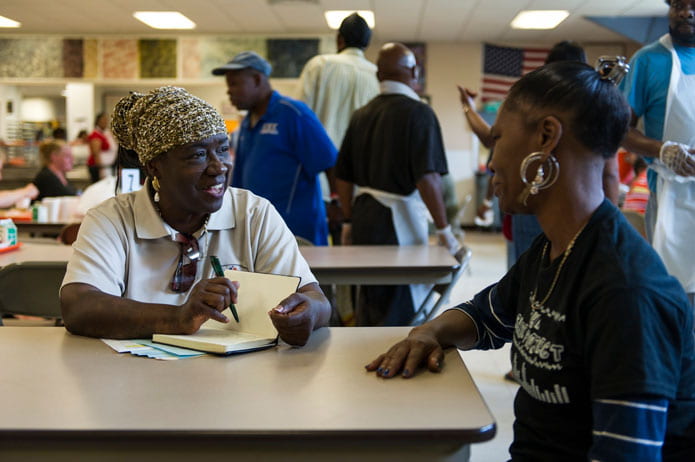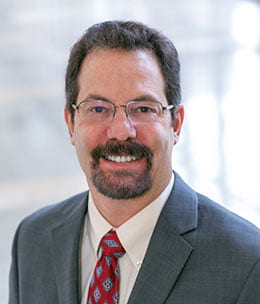Trenton Health Team — Trenton, NJ
IMPROVING DIABETES CARE FOR UNDERSERVED COMMUNITIES IN TRENTON, NJ
Trenton Health Team’s Capital City Diabetes Collaborative is working to improve care and health outcomes among vulnerable, low-income populations through a city-wide, comprehensive approach to diabetes care tailored to individual patient needs.
The Collaborative uses culturally relevant materials to educate patients about managing their diabetes and offers peer support and mentoring, both in-person and through a multimedia technology platform. The Collaborative also works closely with local organizations to help increase patients’ access to healthy food through meal delivery, community gardens, farmers markets, and soup kitchens.

STRENGTHEN PRIMARY CARE & BUILD SUSTAINABLE PARTNERSHIPS
OUR INTERVENTION APPROACH

Our approach, using the Chronic Care Model, is to leverage evidence-based interventions at both the organizational and city-wide level to redesign care and improve health outcomes. The keys to our strategy are using a patient-centered, self-management approach, information innovation to improve scalability, access, data collection and sharing with a robust risk stratification/care coordination backbone.
- Coordinate and standardize care across our region using evidenced-based guidelines to positively impact “ABC” metrics (improved A1c, Blood pressure, and Cholesterol control).
- Leverage our community-wide Health Information Exchange (HIE) and perform detailed data validation on quality measures to ensure accuracy of baseline measurement and enable monitoring of improvement.
- Increase rates of screenings and corresponding interventions for diabetic complications, including retina (using innovative digital technology) and kidney (urine for microalbumin).
- Track compliance with guidelines and measure provider satisfaction to continually improve care.
Through coordinated and strategic educational efforts plus robust peer mentoring, we will work to improve the patient experience and self-management of their disease
- Enhance patient support through peer mentoring programs, incorporating a novel, tested, multi-channel, peer mentoring platform. This approach will enable us to track the number of peer mentors, mentees, interactions per mentor, total interactions, and patients who are involved, in any degree, in this collaborative.
- Identify and/or design culturally appropriate, standardized patient education materials to be disseminated and utilized throughout the city, including Spanish-language materials that are written at an appropriate reading level. We envision the first six months of the project will be needed to agree on the right set of materials, including print, online, and app-based resources, with dissemination to begin in Q3 and ongoing through the project.
- Develop evaluation procedures to improve patient reported outcomes, including patient satisfaction, knowledge, attitudes, and behaviors. Use of the PAM tool will also provide important data in this regard.


We aim to improve the availability of healthy foods for our population. Many Trenton organizations are working on this issue through a range of programs including urban gardening, farmers markets, coordinated food pantries, health corner stores, and expanded use of SNAP and WIC, plus nutrition education that addresses how and where to access healthy food options.
- Build on and coordinate existing resources and stakeholders to increase access and facilitate the delivery of healthy food to our community
- Increase the availability of job opportunities within the community related to food access and support for diabetes programming through public-private partnerships
Increase awareness of healthy behaviors among community members and strengthen the relationship between the community and the Diabetes Collaborative clinics
- Train community members to conduct community outreach in areas surrounding the three pilot clinics, providing coordinated services and helping to connect community members to primary care and social services
Trenton Health Team is focused on supporting unmet medical and social needs:
- Trenton Health Team and their community and clinical partners have integrated a social needs screening and referral platform, NowPow, to improve coordination and accessibility of community resources for residents.
- Trenton Health Team co-facilitates the Trenton Food Stakeholders group with Rutgers Cooperative Extension of Mercer County, Family and Community Health Sciences, NJ SNAP-Ed. The network is made up of more than 50 organizations and 200 participants. The group strategizes specific efforts and resources needed to address the unmet food insecurity needs of their community. The partnership has also facilitated necessary data sharing and a deeper understanding of the real food insecurity issues in the Mercer County region.
- Trenton Health Team established a local care management team (CMT) program to provide social, psychological and health care support to Trenton residents with complex health and social conditions, based on referrals from community partners. The CMT includes a nurse care manager, a social worker, four community health workers, and a community health coordinator. The team embraces whole-person care, screening for unmet medical and social needs, and addressing challenges beyond the exam room that impact health and well-being.


Eric Schwartz, MD, MBA, FACP
Executive Director, Institute for Urban Care
Capital Health; Medical Director, Trenton Health Team
Dr. Eric Schwartz is responsible for the planning and strategy behind Capital Health’s Institute for Urban Care. The Institute focuses on the enhancement of health care services within the Trenton community by understanding and optimizing the patient experience and supporting Capital Health’s role as a regional leader in health care.
Dr. Schwartz is a board certified internist with sub-specialty training in gastroenterology. He earned his MBA in Health Care Management from the Fox School of Business and received a certificate in Managing Health Care Delivery from the Harvard Business School. With more than 20 years of experience as a physician leader in international, public, private, and academic settings, he has played a major role in transforming hospitals and physician groups to optimize quality outcomes, patient experience, and organizational value.
Before joining Capital Health, Dr. Schwartz led the 400-clinician Medical Group of the Christiana Care Health System. He also served as the Chief Medical Officer of the Henry J. Austin Health Center, a federally qualified health center, in Trenton, NJ. He is currently a member of Robin Hood Ventures, one of the region’s largest angel investing groups.
Dr. Schwartz received his medical degree from the Sackler School of Medicine in Tel Aviv, Israel. He was trained in internal medicine at Montefiore Medical Center in Bronx, New York and completed a fellowship in gastroenterology at Temple University in Philadelphia.

Copyright © 2021 — The University of Chicago
